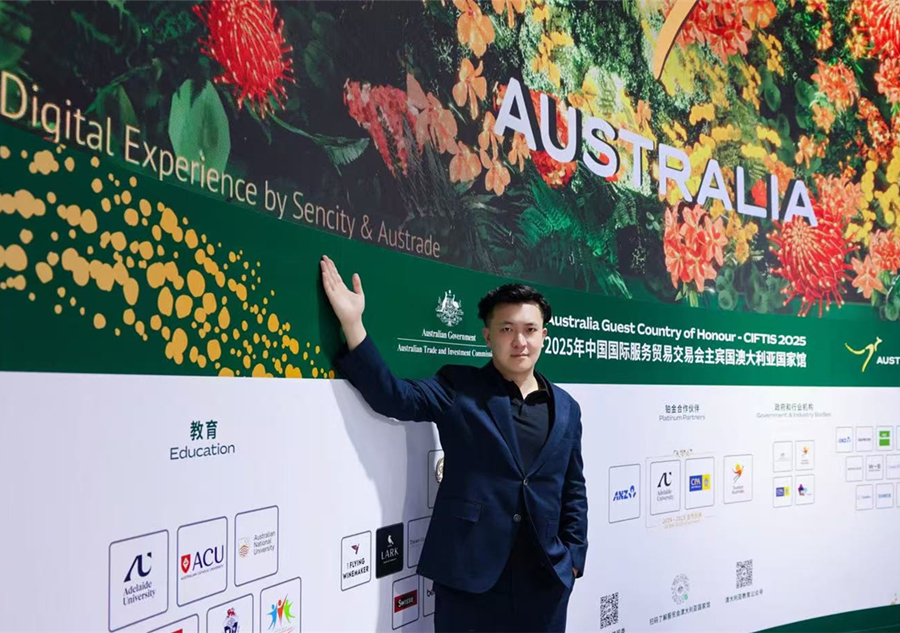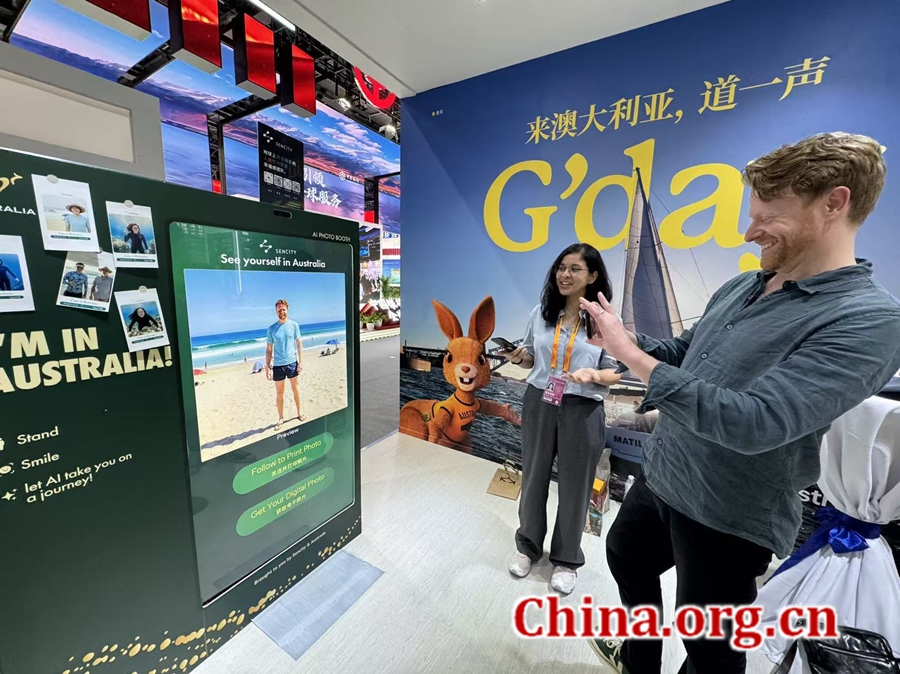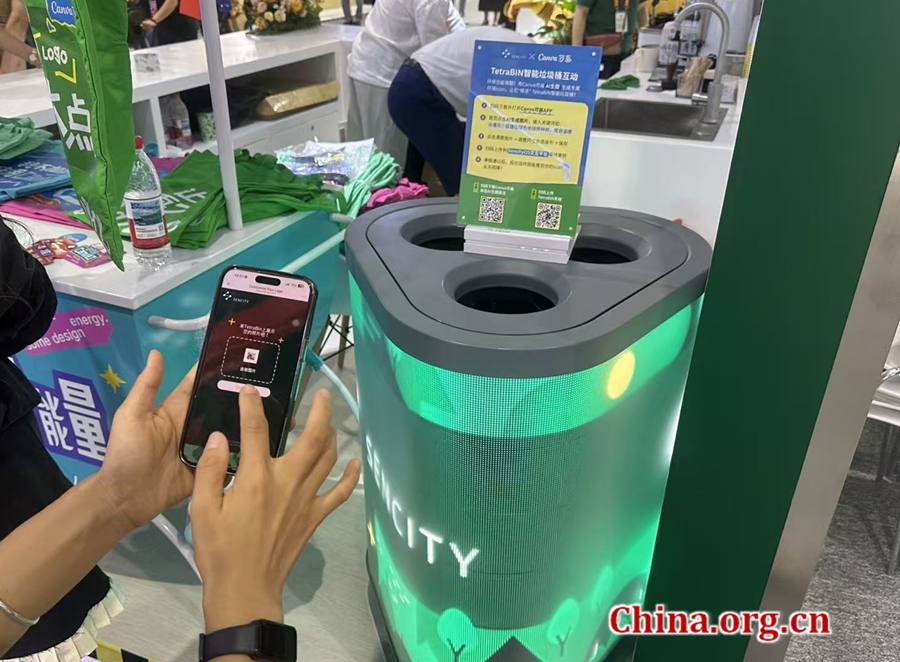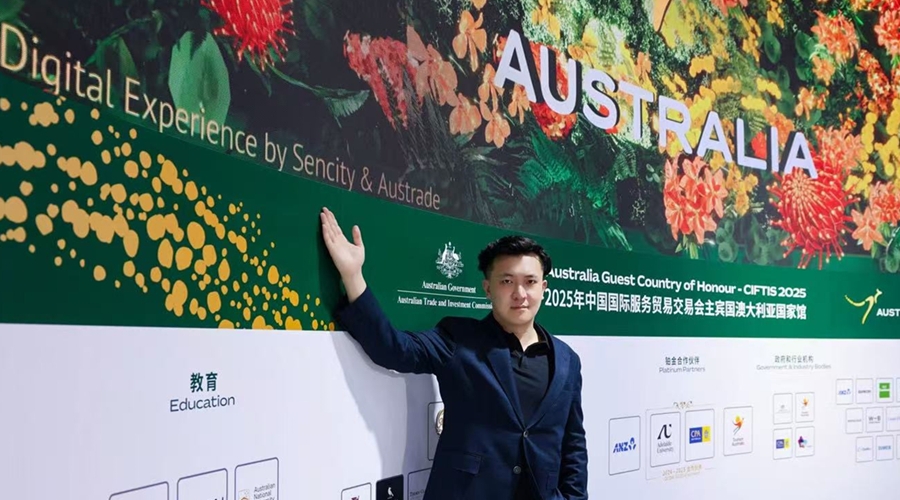Interactive technology company Sencity showcased cutting-edge interactive technologies at Australia's pavilion at the China International Fair for Trade in Services (CIFTIS), which concluded Sunday, where Australia was the guest country of honor.

Steven Bai, co-founder and CEO of Sencity, poses in front of his company's digital art for the Australian pavilion at the 2025 China International Fair for Trade in Services in Beijing, Sept. 10, 2025. [Photo provided to China.org.cn]
Steven Bai, co-founder and CEO of Sencity Corporation, said the company collaborated with the Australian pavilion by providing digital experience designs and interactive installations.
The installations included an "AI Interactive Portal" that lets visitors digitally transport themselves to Australian landmarks like the Sydney Opera House and Great Barrier Reef, then print photo keepsakes of their virtual visits. The pavilion also featured TetraBIN, a smart recycling installation that transforms waste disposal into an engaging and educational experience.
"As an experience-driven company, we ensure that every interaction is smooth, enjoyable, and imbued with human warmth," he said.

A visitor interacts with Sencity's AI Interactive Portal at the 2025 China International Fair for Trade in Services in Beijing, Sept. 13, 2025. [Photo/China.org.cn]
Bai said the AI photobooth transforms traditional group photos into immersive travel experiences using SenSpatial AI, the company's proprietary system that works across different hardware platforms. TetraBIN, one of the company's earliest products, turns ordinary trash bins into interactive environmental education tools.
Though creating these integrated hardware-software products requires combining design, hardware, algorithms and content through lengthy development cycles, the company is guided by one central question: "How can a space respond to people?"
Sencity also developed digital art content for the Australian pavilion's opening ceremony, using technology and spatial design to create a multimedia presentation highlighting Australian and Chinese cultural themes.
"We chose these projects because they represent a balance of culture and tourism innovation on the one hand, and sustainability and responsibility on the other. They combine the magic of technology with human values. The opening ceremony artwork further demonstrates our artistic taste, creative capacity and ability to deliver at an international standard," Bai said.

The TetraBIN smart recycling installation on display at the 2025 China International Fair for Trade in Services in Beijing, Sept. 13, 2025. [Photo/China.org.cn]
The most valuable outcome for Bai at this year's CIFTIS was realizing how complementary the two countries are in innovation and service trade. "The breadth of China's market and application scenarios, combined with Australia's creativity and research strengths, can generate enormous possibilities when brought together," Bai said.
Bai said AI is now deeply embedded in everything the company does, from interaction logic to content generation and cross-device compatibility. AI has become the core of their innovation.
"In my view, AI is moving from being merely a tool to becoming a collaborator," he said. "In the future, AI will not only accelerate processes but also serve as a co-creator with humanity. At Sencity, we envision AI as the 'soul of space' — an enabler that allows architecture, environment, and people to engage in authentic dialogue. By doing so, AI can help drive cross-disciplinary integration in culture, art and sustainability, offering humanity richer and more meaningful experiences."
The executive said their products are well received globally. TetraBIN has been deployed in Australia, China, the United States, the United Arab Emirates, Belgium and other regions in airports, parks and major public spaces. The AI photobooth has gained popularity at international exhibitions and cultural tourism venues, with feedback describing it as "fun, memorable and meaningful."
"China is currently one of our fastest-growing markets, and we look forward to bringing these experiences to an even broader audience. Both products are increasingly regarded as benchmark applications of AI-driven interaction in physical spaces and are often cited as widely imitated business cases across the industry," he said.
Sencity was founded in Sydney in 2016 to make cities more engaging and human-centered. The company now has nearly 100 employees across Australia, China, the U.S. and the U.A.E., with projects spanning tourism destinations, transport hubs and cultural institutions.
"As both co-founder and product manager, my greatest takeaway is this: when technology and creativity intersect, true magic can emerge in urban spaces, enriching human experiences and advancing the evolution of the built environment," Bai said.


 Share:
Share: 




 京公網安備 11010802027341號
京公網安備 11010802027341號